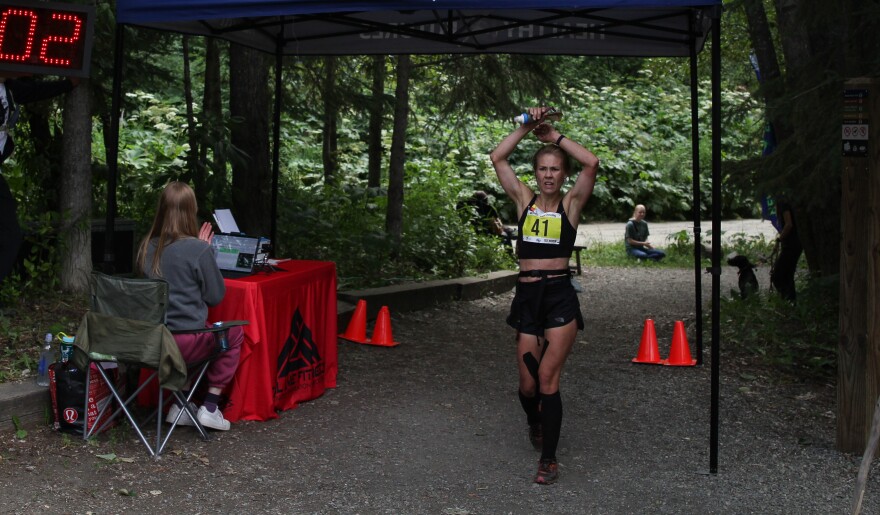On Saturday morning, a small crowd gathered at Eagle River Nature Center. They set up tables of watermelon wedges, pizza and Coke, ready to cheer on the 138 runners who were making their way over the rugged course of the Crow Pass Crossing race.
As volunteers prepared for runners, Harlow Robinson, one of the co-directors, monitored the racers’ progress on his walkie talkie. The course spans 23 miles of mountainous terrain from Girdwood to Eagle River. It’s a scenic trail, Robinson said, over an alpine pass and alongside several glaciers.
“We always tell everyone how beautiful it is, and then we tell them not to look at any of it,” Robinson said. “The trail is so technical that if you take your concentration away from your next footstep, you're likely to take a hard fall.”
Crow Pass Crossing is one of Alaska’s most iconic — and most difficult— mountain races. Ascending from the trailhead in Girdwood, the course climbs up to Crow Pass, then comes back down the other side. Along the way, runners encounter snowfields, wildlife, a fast and frigid river crossing and plenty of tricky rocks and roots. It’s arduous, technical and mostly unmarked, and every year, dozens of runners sign up to compete. This year, the 40th anniversary of the race brought together both hardened veterans of the course and a huge, growing number of rookies. First-timers made up nearly 75% percent of the field.
One of those rookies, Coby Marvin of Palmer, won it all, flying over the finish line at 3 hours, 30 minutes and 33 seconds.
Marvin is the son of past race champions Christy and Ben Marvin, but it’s his first Crow Pass Crossing. At 18, he’s the youngest-ever winner of the race.
Marvin said his favorite part was toward the beginning, as he came up over the pass. Somewhere in the middle, he startled a bear out of the brush, and lost his bib on some overhanging branches. He said the final 8 miles were the hardest part, when his legs started cramping. Coming off the race, Marvin was still breathing heavily and gingerly stretching his legs, which were seizing up.
“It was fun, but also really kind of sucked,” he said. “I was blessed to be out there today and have fun and represent my family.”

Lance Kopsack, of Palmer, finished in just under five hours, which was his goal. He turned 60 this year and this marks his 37th Crow Pass, starting with the first one in 1984.
“You kind of get addicted to it,” Kopsack said, not long after crossing the finish line. “I mean, I don't know what I'd do this time of year if I didn't run, after this long.”
He said a few things have changed over the past 40 years. He doesn’t recognize as many runners as he used to, and his eyesight is getting a little worse. But he said a lot stays the same.
“It’s the same old, nasty trail,” he said. “It’s amazing how well you get to know the trail after that long. It's like, okay, I know there's a rock coming up here.”
Kopsack said he’ll keep coming back, as long as he can.
“When I'm finished, and you're thinking, ‘Oh, maybe this should be the last time.’ But then tomorrow you'll be like, ‘Okay, next year, I can do this or that,’” he said.

For rookies and returners alike, something that sets Crow Pass apart is its pure technicality. It’s a tough course, requiring endurance and skill. Matias Saari, co-director and longtime Crow Pass runner, said it’s a race that keeps you on your toes.
“No two miles are the same. You have to really have a good, wide-ranging skill set. You have to dodge a lot of obstacles,” Saari said.
The variability of the course is what appealed to Breeta Oxnard, a first-time runner.
“You know, you could run this course every day for the next week, and it would always be slightly different. The river would be flowing different,” she said. “And man, it is such a challenge, and such a great group of people, it seems, are attracted to this sport.”
That sense of community was visible — and audible — at the finish line. As runners trickled in, there was an atmosphere of celebration, cow bells and all.
Corbin Wilson said this culture of support is part of what makes running Crow Pass special.
“Everyone's always short of breath, so they're these fun, short, but meaningful, little, like, conversations,” he said. “Because, you know, both people are in pain, and you're just, like, fighting through it together.”
Bennett Pearce and Ethan Cobb reunited at the finish line after meeting on the trail. Cobb — who, by the way, ran the entire race in sandals — said mountain running is a sport that cultivates connection, on and off the course.
“It's like periods of, like, little community,” Cobb said. “You have your little Crow Pass friends, and then you lose them. And then you see him again, like, Bennett here, I was like, ‘Oh, I wonder if I’ll see the guy with the goggles again. Oh, he appeared at the last second. Oh, go goggles!’”
It’s this sense of community, forged by a spirit of adventure, that keeps veterans coming back, and welcomes a new generation of mountain runners. Maybe even future runners, too, like Eric Vilce’s daughter, who watched him run across the finish line.
“Are you going to do running?” he asked her. She nodded, smiling, and gave her dad a big hug.

Spectators cheered until the last runners finished. All 138 runners completed the race, tired, dirty and, many said, ready for a long nap.


